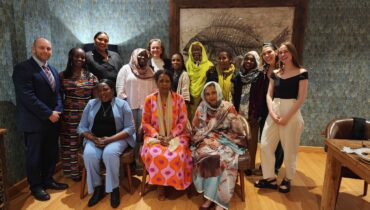In late 2010, violence erupted in Côte d’Ivoire when Laurent Gbagbo, the president of the country, and his opponent, former Prime Minister Alassane Ouattara, both claimed victory in the presidential elections. Conflict between pro-Gbago forces and Ouattara’s allies ran rampant through the country for more than five months, claiming the lives of more than 3,000 people. The crisis particularly affected women, thousands of whom took to the streets in all-women marches to protest of Gbagbo’s refusal to step down. On March 3, 2011, 15,000 women participated in a peaceful protest in the city of Abidjan. Soldiers loyal to Gbagbo opened fire on the protestors, killing seven women. Subsequent protests, including one on International Women’s Day, were also marred by violence committed by pro-Gbagbo forces. Women also experienced sexual and gender-based violence (SGBV) during the conflict, and were among the thousands displaced by violence. There is a critical need to provide justice for those who were victims of the gross human rights violations perpetrated throughout the country’s conflict in order to promote healing and lasting peace.
Transitional justice – the mechanisms used to provide justice and healing after conflicts – can lead to a greater sense of peace and security for individuals, families, communities and the country as a whole. Attempts to promote justice post-conflict in Côte d’Ivoire have taken many forms. In the aftermath of the crisis, Côte d’Ivoire established the Commission Dialogue, Vérité et Réconciliation (Commission on Dialogue, Truth, and Reconciliation, or CDVR) to discover the truth about human rights violations committed by both sides during the conflict, and to advocate for reconciliation. The CDVR collected testimony from over 70,000 witnesses, including more than 28,000 women, but has yet to release its final report to the public. Its successor, the National Commission for Reconciliation and Indemnification of Victims, will oversee a reparations program for victims of human rights abuses from 1990 to 2012. Another government organization, the Cellule Spéciale d’Enquête et d’Instruction (Special Investigative and Examination Cell, or CSEI), is charged with investigating and prosecuting perpetrators of crimes committed during the post-election conflict. International organizations, particularly the International Federation for Human Rights and its partners, have pressured the CSEI to investigate SGBV crimes committed against women.
The most visible step taken toward justice for victims of the conflict, however, is the prosecution of Gbagbo and his ally Charles Blé Goudé (as well as the charging of Gbagbo’s wife) in the International Criminal Court (ICC). Gbagbo and Blé Goudé, whose trial began January 28, 2016, are each charged with four counts of crimes against humanity under the Rome Statute: murder, rape, other inhumane acts (or, in the alternative, attempted murder), and persecution. These charges relate to four separate incidents during the conflict, including the March 3 protest killings.
The trial, which marks the first prosecution of a former head of state by the ICC, is not without controversy: critics charge that the ICC’s prosecution is one-sided and ignores crimes allegedly committed by Ouattara allies; Ouattara has refused to send any more Ivoirians to the ICC, meaning he will not allow his allies to be prosecuted; and the identities of several protected witnesses were inadvertently revealed,exposing them to potential harm.
Despite these problems, this trial may mark an important milestone in the quest for justice. Gbagbo and Blé Goudé will have to answer for their alleged crimes in an international forum. Crucially, their alleged victims will be able to participate in the trial: more than 700 victims have been granted the right to take part in the trial. Their legal representative, a member of the Office of Public Counsel for Victims, will be able to participate on their behalf in all hearings and make opening statements, and may be allowed to submit evidence and question witnesses. This function of the ICC ensures that at least some victims are able to play a role in confronting perpetrators.
The Gbagbo/Blé Goudé trial may drag on for some time—Chief Prosecutor Fatou Bensouda estimates the case may last three to four years. This international proceeding, however, together with the domestic transitional justice processes, may bring some measure of justice to victims, particularly women who protested for peace or who were caught in the crossfire.
About the Author
Chloé White is the 2015-2016 Hillary Rodham Clinton Law Fellow with the Institute. She received her J.D. from Georgetown University Law Center in 2015 and an A.B. in Political Science with a minor in French from Washington University in St. Louis. During her time at the Georgetown University Law Center, Ms. White served as President of Georgetown Law Students for Reproductive Justice and Co-Managing Editor of the Georgetown Journal of Gender and the Law, and held internships at the Center for Reproductive Rights, the National Women’s Law Center, and the U.S. Department of Health and Human Services. She previously worked as the government affairs assistant for the National Safety Council, and as a legislative assistant for Rep. Dennis Moore [D-KS]. Ms. White is licensed to practice law in the state of New York.


